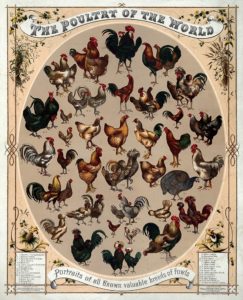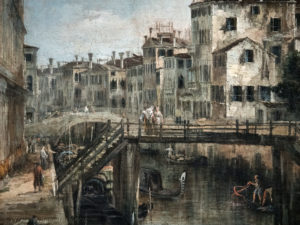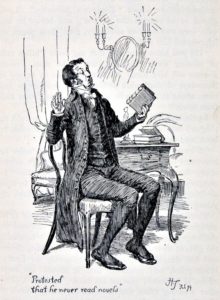
Nobody spoke for a moment. At the sight of Mr. Collins standing in the doorway of Lord Byron’s apartments at the Palazzo Mocenigo, the persons assembled wore expressions ranging from surprise, horror, and pained disdain; but no one looked at all happy. Mr. Collins, who seemed the least distressed, was the first to speak.
“Lady Catherine!” he exclaimed. “This is the residence of Lord Byron you have brought me to, I collect?”
“Yes, to be sure,” she answered him shortly. “I told you it was.”
He bowed. “I apologize for intimating that I did not remember your proffering that information, and I beg you to be sure that I never intended you any discourtesy. It is only that I find it hard to believe.”
“Why so, Mr. Collins? Surely you can perceive that this is the Palazzo Mocenigo, and that,” she pointed with an accusatory finger, “is none other than Lord Byron himself.”
“I had realized that at once, Your Ladyship. Lord Byron is one of the most famous faces in all of England, and indeed, upon the whole Continent, which is to say the world. His portraits are every where, so even though he does now appear fatter than the handsome poet of the images, I could not help but recognize him. But,” he concluded impressively, “I shall not give him my bow. He does not deserve it.”
Every one in the party was flabbergasted, and some were struck with the thought that it was a singular misfortune to be connected with Mr. Collins as they were; but after a moment, Lord Byron’s curiosity moved him to speak.
“Not bow? Well, that is a curiosity. May I know the identity of this person who will not greet me with ordinary civility, in my own house?” He looked Mr. Collins up and down, and saw a tall, stout man, in the fine black suit and white Geneva neck tablets that made him instantly recognizable as a clergyman. “By heavens, I do believe that our palazzo is being honoured by the presence of an actual English man of the cloth, if I make no mistake, Darcy!”
“Of course you are correct, Byron. This is Mr. Collins, who has the honour to be a cousin of my wife’s, and the good fortune to have my aunt, Lady Catherine, as the patroness of his parish in Kent.”
“You don’t say so!” breathed Lord Byron, with a look of being greatly diverted, which he shared in a sidewise glance at Elizabeth.
“I can vouch for my husband’s veracity,” she said dryly, “Mr. Collins is indeed my cousin.”
“And a very useful kind of young man he is,” nodded Lady Catherine. “Why, he has never once failed in his duty to his parish, and most of all, to me.”
“Yes, I am indeed extremely fortunate in my cousins and in my patron,” said Mr. Collins, with a self satisfied air, “as Mr. Darcy says so truly; it would be hard to determine which I esteem most. But I must, in all candor, inform you, Lord Byron, that I am not at all pleased with you.”
“You don’t say so?” exclaimed Lord Byron, pulling a humorously amazed face.
“No, not at all,” said Mr. Collins gravely. “It pains me to tell you such hard truths, but as a clergyman I am required to do such distasteful things every day. Here, in this instance, I owe it to this company, and to myself, to fulfill my duties of setting a moral example. This I must do, where ever I go, even in such an un-English, immoral country as Italy is. Why, it is the hotbed of the Catholic persuasion, with hardly a real, honest, God fearing Church of England practitioner in it!”
“That point cannot be argued, certainly,” said Lord Byron, with interest, “Italy must always be un-English; though you seem to have a singular way of looking at the country with the most beautiful art, climate, food, and women in the world. But let us not stand longer in the doorway to conduct this theological discussion. Will you all not come into the saloon, to talk about these things in comfort? And then it will be time for dinner.”
“I cannot,” said Mr. Collins impressively, “set foot inside a house of sin. It would be no less than giving approval to the immoral, licentious, wicked practices which have earned you a most regrettable measure of world wide fame. Moreover, I should be observed, and a clergyman’s visit would doubtless be seen to confer a respectability upon a place and person, which they do not deserve.”
“I think,” put in Elizabeth, “Lord Byron is famous for his poetry; and if you have scruples against sitting in his very comfortable saloon, the garden at least has the merit of being out of doors, in the open air, as most such places are.”
“That is prevarication, cousin. It is a form of compromise, which is not at all a proper thing. I begin to perceive that your own sense of morality, once as delicate as that of my own wife, is in process of being corrupted, by your unfortunate residence in this wicked place.”
“You are mistaken about my wife,” said Darcy, starting to glower, “she does not deserve to be spoken of with such disrespect.”
Mr. Collins bowed in his direction. “Certainly not, I meant no disrespect to Mrs. Darcy, or her heretofore stainless reputation. I was only warning of the dangers in consorting with people of evil practices, as it is ever my duty as a clergyman to do.”
“The garden is well thought of,” Byron agreed, ignoring the rest. “I am sure our guests are wishing to sit down, and it is a balmy evening. I have been informed that a dinner with four couple of ducks is preparing, and you must surely be in need of nourishment after your long journey.”
“Ducks?” Mr. Collins looked interested. “I did not know they served any thing so good here in Italy. The food I have encountered so far in my journey has been hardly palatable and it has been very difficult to keep up my strength with such deprivation.”
“Lord Byron keeps one of the finest tables in Europe,” Mr. Darcy observed distantly.
“I might have suspected as much. A sybarite, a hedonist, always is a glutton as well, if he but has the means,” Mr. Collins nodded.
It was clear that his appetite was quickly winning over his sense of moral duty, and Lady Catherine was silent, for a wonder, so it was without further difficulty that the party was persuaded to walk into the garden, and to sit in the glow of the late afternoon sun, falling on the olive trees.
“It is really very pretty here,” observed Mr. Collins, seating himself with a relieved sigh. “This water view – and you have the same on your side of the house, Darcy, too, of course. Do you know, this garden almost reminds me of Rosings, though of course Rosings does not have a canal, and is all the better for that. Nothing, after all, can equal Rosings. The water here does not look quite clean. It is indeed an image that speaks eloquently of the moral failings of this city and its people. A very sluggish stream, indeed.”

“If you will have it so, Mr. Collins,” said Lord Byron, shrugging. “I swim in the canal often, and have found it clean enough. Perhaps you will think better of this fifteenth-century architecture? Though to be sure England has its ancient palaces too.”
“Oh! Nothing can be finer than the great houses of England,” exclaimed Mr. Collins, and was just drawing breath to commence a long harangue on the subject when Lydia interrupted.
“Lizzy, what shall I do, Lord Byron’s baby here has soiled himself,” she said plaintively, “and I misdoubt that he has any cloths for the purpose. Perhaps little Allegra’s nurse can come and clean up baby Georgie.”
“Lydia, for shame. Take the child back to our house and deal with him there.”
“Oh, by no means,” spoke up Mrs. Hoppner, “now that Allegra has been put to bed Elise has nothing to do. She is a very nice, capable Swiss girl. Come, Mrs. Wickham, I will show you the way to the nursery.”
“Oh lord, after this it will be impossible to get her out of here,” Byron murmured to Elizabeth, but Mr. Collins’ raised voice prevented him from further expression of his thoughts.
Rising to his feet Mr. Collins thundered at Lydia: “Lydia Bennet! Mrs. Wickham! You withdraw at peril of your immortal soul. Stand here like an honest woman, if you can, and listen to me. You have already offered such insult to your family entire, that it is a miracle that their reputations have not been universally ruined, and for ever. But this is the apogee of your shame! Who can forget your living with Wickham before marriage – the concocted contrivance that was your wedding – and that you were one of the most fortunate fallen women in England, to be given the mercy of redemption by the charitable arrangement of your honoured brother-in-law, Mr. Darcy. And now you despoil your family once again, by a liaison with one of the most sinful men on the planet, and have born his – his – “
Before he could say the word, Lizzy exclaimed with some urgency, “Oh good heavens, Mr. Collins, cannot all this wait. The child requires cleaning up care. Dear Mrs. Hoppner, you will oblige us all greatly if you escort my sister and the baby to the nursery.”
It was done. Mr. Collins reseated himself, and there was a general sigh of relief.
Lord Byron smiled at Lizzy. “Mrs. Darcy, if my house already smells of brimstone, as I gather Mr. Collins thinks it does, at least we can thank your quick thinking for preventing a more odious perfume.”
“My cousin did well to speak,” Mr. Collins said almost apologetically, and added, “I hope I can take Lydia’s remarkable proclamations with several grains of salt, Lord Byron.”
“Oh, certainly. The child is not mine. The trouble is that we do not know the whereabouts of its legal father, Mr. Wickham, at the moment. If we did, then the Wickhams might be persuaded to return to England together, and I for one should be glad to see the back of them.”
“I am rejoiced to hear such a sensible sentiment – indeed, almost decent – from you,” said Mr. Collins. “Perhaps I have been doing you a disservice, and your character is not yet entirely lost.”
“I think, Mr. Collins, it is not for you to decide, said Lizzy. “You are Lord Byron’s guest, and censure is a singular way to requite hospitality.”
“My dear cousin Elizabeth, I much appreciate your kind advice, as ever, but you must allow me to think my own judgment, as a clergyman, and several years older than yourself, is more worth attending to than that of a young married lady, and one who, moreover, is sister to a wanton. No, no, a clergyman speaks with the word of God, and must be heeded.”

Elizabeth did not care to continue the argument, and catching her husband’s eye, shook her head just a little, to indicate that she did not wish him to come to her defense. Fortunately, at this juncture, the servant Giuseppe came with the announcement that dinner was ready, and they all arose and filed into the dining room, Mr. Collins making no further objection, but stepping toward the food with alacrity.
In fact, Mr. Collins’ mood of disapproval visibly mellowed considerably under the influence of ducks perfectly roasted in their crispy skins with a raspberry glaze, and with the accompaniment of risotto with mushrooms and Italian chicory, a dish of pesce en saor, fried fish marinated with vinegar, raisins, pine nuts, and eggplants, and a platter of soft shell crabs. All was served with the finest Italian wines and the sweet course especially toothsome, with puff pastry flavored with orange peels, and torrone, a cake made of nougat, honey, and almonds. About halfway through the meal Lydia reappeared, and was happy to tuck into a substantial dinner, with her usual messy table manners, but at least in silence.
After the meal, and over brandy, which he protested against drinking but was persuaded by the other gentlemen, Mr. Collins gave only a feeble suggestion about discussing the matter of his purpose in coming to escort his patroness home to England, and the desirability of the rest of the company taking the journey together.
“Now, the matter will rest until tomorrow,” Lord Byron jovially assured him. “There is no reason for you and Lady Catherine to delay your departure.”
“The sooner the better,” the lady said with asperity. “The sooner every one leaves Italy, the better.”
“We hope to have the honour of your family accompanying us, Mr. Darcy,” Mr. Collins added, “you must be anxious to be back in England.”
Mr. Darcy drew his dark brows together in consernation. “We are indeed,” he admitted, “but as we have said, Lydia must be escorted back too – “
“I will not travel with that creature,” said Lady Catherine emphatically.
“I don’t want to travel with you either,” Lydia retorted.
“The point is that she must be escorted by her husband,” Mr. Darcy finished patiently. “They need to be reuined, taken out of Italy, and matters arranged for them settling back in England.”
“You set yourself no small task, Darcy,” Lord Byron commiserated. “I tell you, we must set up a search party. We can start by scouring one opera house and musical theatre after another. He will turn up soon enough.”
“I think you are right,” Darcy said grimly. ‘Shall we start with Teatro La Fenice?”
“We can see Sigismondo,” Lord Byron observed, “though it is not as good as Tancredi, but Rossini is always a pleasure.”
“And will you take me, Byron?” Lydia demanded. “After all, it is my husband we’re looking for.”
“You! To be sure not. I will take my own lady, Teresa. She is escaping her husband for a visit with me, and will be charmed to go to the opera.”
“Who is she? Where is she? Is she prettier than me?”
“She is Contessa Guiccioli, since you insist upon asking. She will be staying here, with me. Yes, she is much prettier than you, with dark hair and eyes, and much younger.”
Lydia was silenced.
“You will go with us, Lydia,” said Darcy shortly. “And we will all look for your errant husband together.”
“While Teresa and I listen to the truly divine music,” said Byron, with satisfaction.
“You are blaspheming again, Lord Byron,” said Mr. Collins, but without any conviction.

6 comments
Skip to comment form
Mr Collins never improves does he? I do hope Charlotte is enjoying the lack of his company? Lydia is an absolute disgrace, hopefully they’ll find Wickham and get rid of both of them 🤞🏻. They should give her all Elizabeth’s ruined clothes as a wardrobe, maybe she’ll take more care when she has nothing else?
Thanks for your kind comment as always, Glynis! I have several different ways to get rid of Wickham and am mulling them over. Darcy could get him “a position about the court” which is what he wants. Or he could remain with the opera singers, and with his good looks take up his most appropriate position and stay in Italy as a cavalier servente. Such possibilities!
LOL! OMG! Mr. Collins…oh Mr. Collins. He is too funny by far. Could you imagine him on the boat crossover from England to Italy? He probably moaned the whole way over, and the crew probably almost threw him overboard. And as for Lydia & Wickham and perhaps even Lady C, if I were ODC I would leave them in Italy…and Mr. Collins too. LOL! Thanks Diana!
Thank you, Char! You have made me want to see that scene too, and I will write it. Only a few chapters left.
Oh my G!!
Dear me!
Please, make them all part – and Mrs B come. She must be exhausted after seeing after Wickham progenies…! She nees a vacation too!
Mihaela, I had not thought of that! Of course Mrs. B needs a vacation! But…she needs one from herself. Italy would not answer.